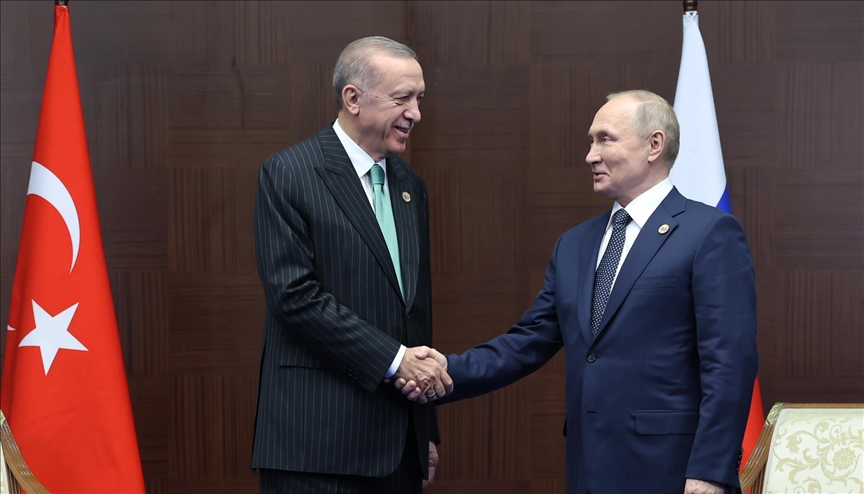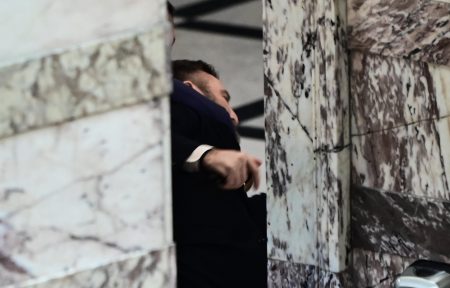Turkish President Recep Tayyip Erdogan and Russian President Vladimir Putin held talks last week in Astana, Kazakhstan.
They jointly announced the projected completion in six months of Turkey’s Akkuyu nuclear power plant.
In his official remarks, Putin proposed to Erdogan that their two countries collaborate for Turkey be transformed into a major energy hub, capable of providing Europe with a natural gas alternative.
The next day, Erdogan hastened to clarify that this alternative hub will be established in Eastern Thrace, almost across from the Greek port city of Alexandroupolis, which has already developed into an energy and geopolitical base that is important at many levels.
In any event, the tight embrace of the two leaders is a given, as is Turkey’s shift toward the East, although that does not mean that Ankara will cease bargaining with the West and Europe.
By all appearances, Tayyip Erdogan has adopted Vladimir Putin’s conception of a multi-polar world.
In that framework, he is pursuing a specific role for himself and his country, but he also wants to cover all the bases.
Τhat is demonstrated by his procurement of advanced American fighter jets and weapons.
Erdogan’s talks with Putin were proceeded by the sudden visit to Istanbul of US National Security Advisor Jake Sullivan for a meeting with Erdogan’s advisor and closest confidant, Ibrahim Kalin.
In talks that lasted many hours, the two covered much ground and all major running issues were placed on the table, including tensions in the Aegean and the Eastern Mediterranean.
That was followed, with the help of American urgings and mediation, by the historic Israel-Lebanon agreement to jointly exploit natural gas deposits at the borders of the two countries’ maritime zones (EEZs).Since then, Turkey’s intense rhetoric against Greece has receded somewhat.
On 13 October, at the margins of the NATO summit in Brussels, Defence Minister Nikos Panagiotopoulos and his Turkish counterpart, Hulusi Akar, held a 40-minute meeting, in what was billed as a cordial climate.
They reportedly agreed to re-open channels of communication and to jump start a process of regular contacts between the two sides.
The next day, Turkey’s ambassador to Athens, in an informal briefing, conveyed conciliatory signals.
He appeared to leave open the prospect for a dialogue on differences regarding the delimitation of the two countries’ continental shelves and EEZs, highlighting the issue of the EEZ of the Greek island of Kastelorizo.
No one can prejudge the results of these hard to interpret and not always interrelated international contacts and initiatives of the Turkish leadership.
Obviously, Erdogan is largely motivated by an expansionist vision, yet he is receiving from abroad ever sterner signals that differences with Greece must be peacefully resolved.
The truth be told, Turkey has undergone a great transformation during Erdogan’s over 20 years in power.
Its population has greatly grown (from 65mn to 86mn), its society has been transformed, its productive base has been restructured, and its defences have been strengthened.
Politically it has shifted away from the Kemalist principles of the secular state and has chosen the path of Islamification, along with the path of authoritarianism, as the recent “disinformation” law, limiting freedom of the press and imposing prison sentences of up to three years for journalists who violate it in Turkey, demonstrates.
The current Turkish puzzle does not provide us with a secure image of the country’s prospects.
We must not forget that the US Senate’s so-called “Menendez amendments” [which would limit Ankara’s use of American F-16 fighter jets] were not incorporated in the US Pentagon’s budget, which rekindles Turkey’s hopes of procuring the war planes.
There is nothing to say that the apparent softening of Ankara’s rhetoric toward Greece is not simply a tactical manoeuvre, linked with the achievement of Turkey’s fervent arms procurement pursuits and objectives.
That alone shows us that the future of Greek-Turkish relations is unclear.
The concept of an “armed peace” is not groundless, but that does not mean that we shall all be overtaken by an underlying, almost blanket populism in favour of a disastrous confrontation.
On the contrary, we have an obligation to utilise every window of opportunity to achieve a peaceful resolution of bilateral differences, especially when it is determined by the principles of international law and examples such as the Libya-Lebanon agreement.





